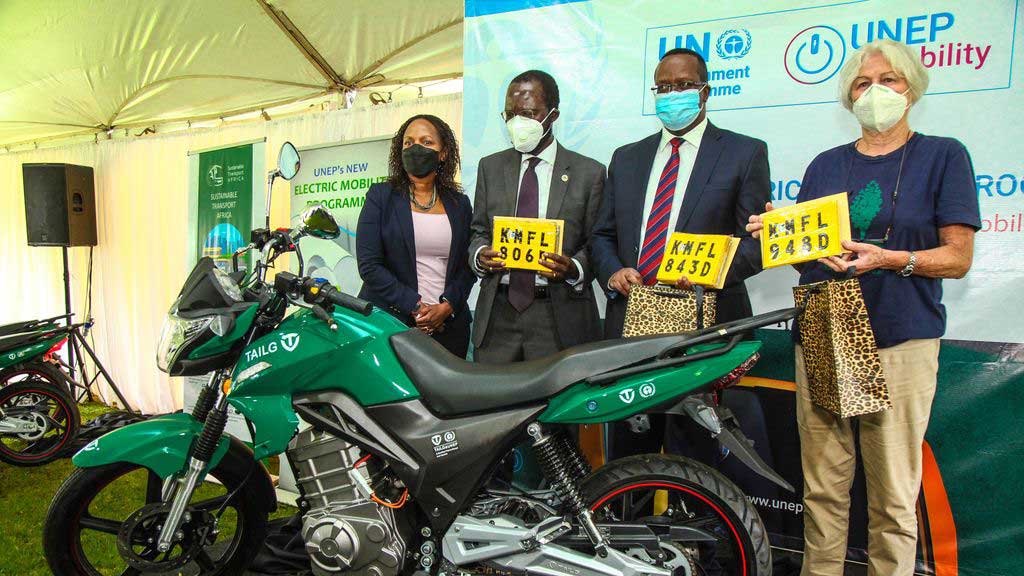
from https://thewestsidegazette.com
Two-Wheeled Hope: Kenya Embraces Electric Motorcycle Project, Ups E-Mobility Goals
One of the world’s largest urban forests sits just outside Nairobi, one of Africa’s busiest cities. Amid its tranquility, the setting is often pierced by ear-splitting gasoline motorbikes emitting fumes as rangers patrol for poachers, intruders and watch over visitors.
“Normally, we use gasoline motorbikes to patrol this forest, making it impossible to nab culprits because of the noise. In many instances, we have been fighting a losing battle,” John Chege, the infrastructure coordinator from Friends of Karura Forest, told Zenger News.
But now, thanks to an electric motorbikes pilot project recently launched in Nairobi, Friends of Karura Forest is getting a donation of electric motorbikes.
Implemented by the United Nations Environmental Program, it is part of a larger initiative: Integrating two and three-wheelers into existing urban transport modes in developing and transition countries. The effort is funded by the International Climate Initiative of the German Federal Ministry of the Environment, Nature and Nuclear.
Thanks to an electric motorbikes pilot project recently launched in Nairobi, Friends of Karura Forest is getting a donation of electric motorbikes. (Courtesy United Nations Environment Program)
The goal is to curb greenhouse gas emissions by helping countries reduce their dependence on fossil fuels.
Chege also said the bikes will help rangers move swiftly and more quietly through the vast forest of 2,752 acres.
“Since they are fast and do not emit much noise and minimal air pollution, we are sure of providing forest security efficiently, while tackling environmental problems,” Chege told stakeholders at the launch.
Despite the Kenyan government hope to transition into a 100 percent green energy nation, with more than 80 percent of its energy coming from hydro, solar, geothermal and wind, it still imports more gasoline motorbikes than cars, doubling its fleet every seven-to-eight years. It’s estimated that the newly registered gasoline motorcycles, commonly used as taxis (boda-boda), which stood at 1.5 million in 2018, will likely hit 5 million by 2030.
With the two and three-wheelers accounting for the same amount of emissions as a passenger car, Africa could see a 50 percent increase in air pollution by 2050 in low- and middle-income countries by 2050, according to a study by the Global Environment Facility.
“Now is a critical moment in the transition to electric mobility. Although we are at relatively low levels, we are 2 percent of sales globally, the change is coming exponentially. The volume is doubling less than every two years,” said Nigel Topping, the UK Government High Level Climate Action Champion for the upcoming United Nations climate talks, known as COP26.
According to Topping, it is possible to end the use of combustion engines and their associated health and climate effects.
“The shift toward electric mobility is a much-needed technology in saving the environment from pollution, and this pilot project will help. We have to grasp this opportunity, which will change the way we move in our cities. We are committed to it,” said James Macharia, Kenya’s Cabinet Secretary for transport, infrastructure, housing, urban development and public works.
Joyce Musya, UNEP deputy executive director, says motorcycles being imported by Kenya are generally inefficient and poorly maintained. “Shifting to electric bikes in Kenya, Rwanda, Uganda and elsewhere will reduce costs, air pollution and greenhouse gas emissions, as well as create jobs,” said Musya.
Environment Program in Nairobi. (Courtesy U.N. Environment Program)
The bikes, donated by Shenzhen Shenling Car Co. Ltd., will last six to 12 months and will be replicated in Uganda, Ethiopia, the Philippines, Thailand and Vietnam.
“We are committed to set up charging ports across the country to support growing demand for electric-powered vehicles and motorbikes,” said Brian Ngugi, managing director at Kenya Power, the country’s electricity transmission company.
The motorcycle industry supports 5.2 million Kenyans directly or indirectly, which is about 10 percent of Kenya’s population. There are 1.4 million motorcycle riders in Kenya.
Keffa Mwendwa, a boda boda rider, has been using an electric bike for six months within Nairobi, courtesy of Ecobodaa, a Nairobi-based startup that operates on a rent-to-own model. He sees many plusses.
“As compared to the gasoline motorbikes, maintenance is cheaper,” Mwendwa said. “I don’t have to do engine services like changing oil or changing chains. I only have to change brake fluid and tire pressure.”
